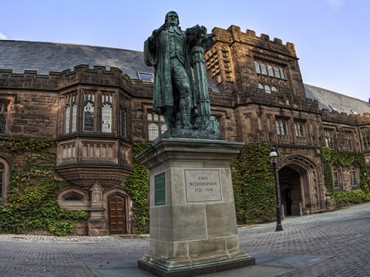
UPDATED
Both surveys based on White House recommendations that prejudge students
Princeton University has rejected a survey developed by the Association of American Universities to gauge the prevalence of sexual assault on its campus, opting to develop a survey modeled off one at Rutgers University instead.
Both surveys, however, are based on White House recommendations that seem to prejudge accused students.
According to The Daily Princetonian, Princeton is developing the survey to comply with its Title IX settlement with the Department of Education concerning sexual-assault investigations. It’s not the first to reject the AAU survey, whose secrecy has troubled researchers.
Princeton was forced by the government last fall to abandon its longstanding use of the “clear and persuasive” standard for assessing guilt, now using the “more likely than not” standard to decide whether accused students are guilty of sexual assault, as The College Fix reported.
The Rutgers survey on which the Princeton survey will be modeled hasn’t been fully vetted, by Rutgers’ own admission.
“While it is based on the survey published by the White House Task Force, the survey, as presented in this document, should be seen as an untested pilot tool,” the Rutgers School of Social Work warns in the survey description. “Therefore, other institutions wishing to use this survey should be aware that the validity of the instrument as a whole has not yet been determined.”
E.J. Miranda, a Rutgers spokesperson, told The Fix that the university has not finished reviewing the data from the survey, which was conducted Oct. 27-Nov. 9.
“We are analyzing data from the survey and will be conducting focus groups this semester to gain more in-depth information from students about their perspectives on the campus climate,” Miranda said.
The results should be available sometime during the summer, Miranda said, but did not answer if Princeton had consulted Rutgers about the survey’s limitations.
Drunk sex is rape, again
The Rutgers survey minimizes any responsibility that an accusing student might bear for a sexual encounter.
Two questions ask: “Just prior to the incident(s), had you been drinking alcohol? Keep in mind that you are in no way responsible for the assault that occurred, even if you had been drinking.”
The survey conflates the terms “unwanted sexual contact” and “sexual assault,” and it seems to define drunk sex as inherent assault, apart from “incapacitation.”
“Since coming to Rutgers, has someone had sexual contact with you when you were unable to provide consent or stop what was happening because you were passed out, drugged, drunk, incapacitated, or asleep?” two questions ask.
The White House guidelines on so-called campus climate surveys are heavy on presuming guilt, frequently referring to accusing students as “victims,” but light on prevention suggestions.
NotAlone.gov says the surveys are important because “victims rarely report sexual assault to law enforcement,” “many victims do not even access formal services” and “victims may feel more comfortable coming forward” when campuses make an effort to address assault.
Useless without ‘comparative analysis’
The AAU survey has been questioned for its reliability. Only “aggregate data” will be publicly released from schools that use it, and its design won’t be released until a university agrees to use the survey.
Those conditions led a group of professors who describe themselves as “experts in the measurement of sexual violence” to reject the survey in a November letter to the AAU, saying that it’s useless without “comparative analysis” among “subgroups of peers.”
Not only does the AAU survey prevent each school from modifying it for their own purposes, but the advisory committee that designed it only has two members with “any experience in survey assessment on sexual assault,” in contrast to “several lawyers and administrators,” the professors said.
Michele Minter, Princeton vice provost for institutional equity and diversity and co-chair of its Faculty-Student Committee on Sexual Assault, told The Daily Princetonian that flexibility to ask its own questions helped convince Princeton to use the Rutgers survey.
Minter deferred questions from The Fix to school spokesman Martin Mbugua. He told The Fix that Vice Provost Jed Marsh “and a committee are working on developing the plan for that survey, which will be sent to all undergraduate and graduate students this spring.”
Mbugua said the survey aims to comply with the Title IX resolution agreement, specifically the “Climate Checks” portion, which suggests the campus survey asks about “student’s knowledge of sexual misconduct.”
The AAU itself warned in November about the dangers of a “one-size-fits-all survey that would provide potentially misleading data,” in announcing it would design its own to fend off a possible survey mandated by Congress or the White House.
Many universities are rejecting the AAU survey for that precise reason. A University of Rochester spokeswoman told Inside Higher Ed it was designing its own “so that we can tailor the questions to our own needs.”
Barry Toiv, vice president for public affairs at AAU, told The College Fix in a phone interview that a survey of national scope – possibly one mandated by the government – would lump together too many different types of universities.
While the AAU has a diverse mix of schools, Toiv said, its survey will focus mainly on research institutions that are also mainly residential.
Toiv noted that Princeton has said it rejected AAU’s survey because of time constraints related to its Title IX settlement with the government, not the survey’s quality. AAU is encouraging schools that use its survey to disclose their own results, he added.
CLARIFICATION: Schools that use AAU’s survey can choose to keep their individual results secret or disclose them, but AAU itself is publicly releasing “aggregate data” across all schools that use the survey.
College Fix reporter Matt Lamb is a student at Loyola University-Chicago.
Like The College Fix on Facebook / Follow us on Twitter
IMAGE: Kah-Wai Lin/Flickr





Please join the conversation about our stories on Facebook, Twitter, Instagram, Reddit, MeWe, Rumble, Gab, Minds and Gettr.